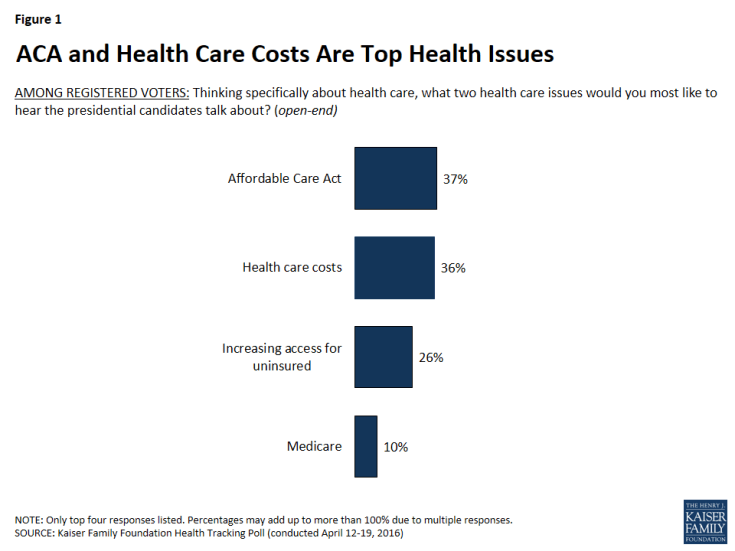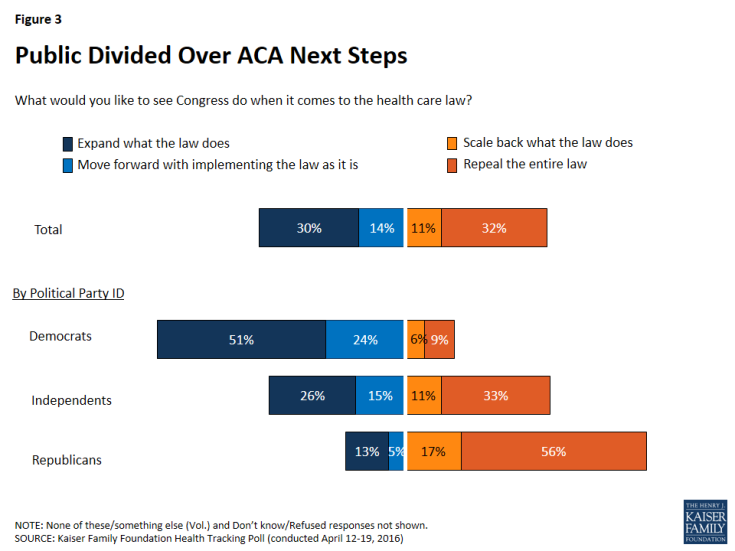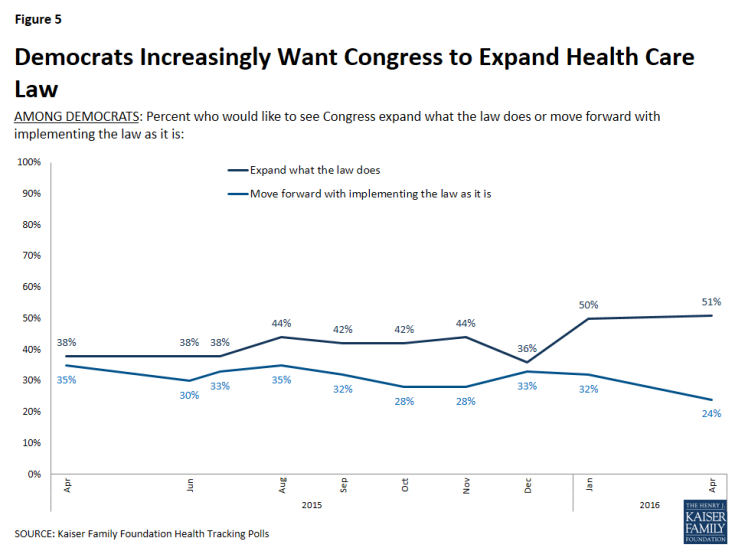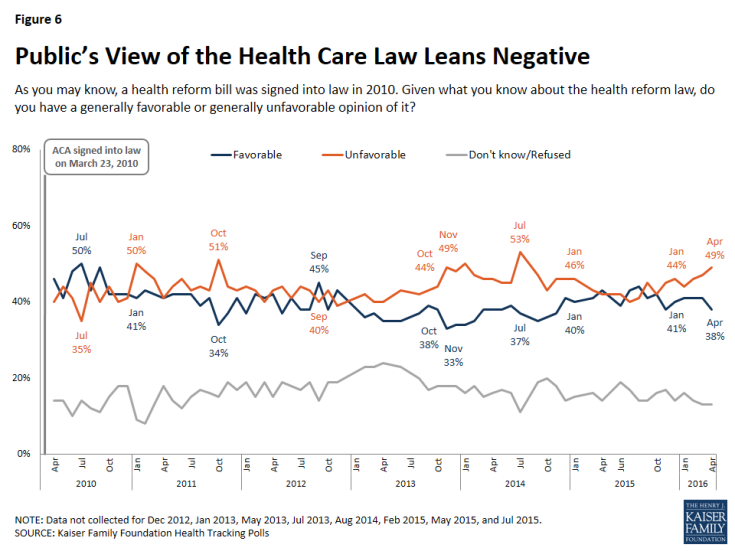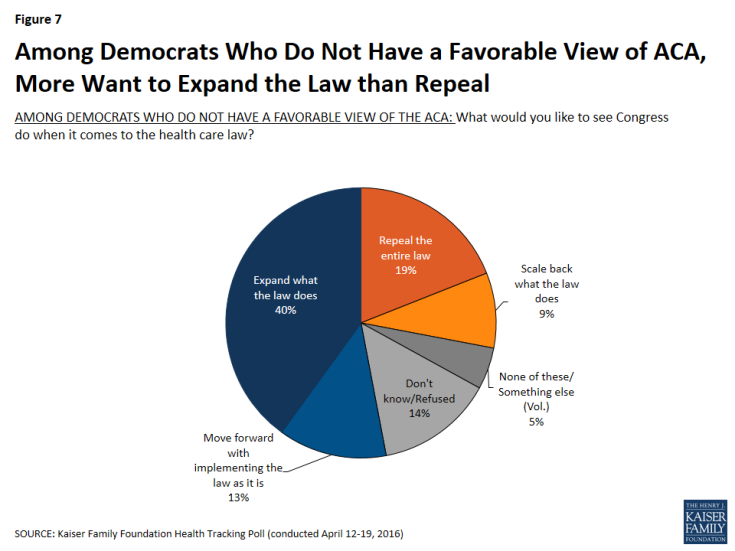Kaiser Health Tracking Poll: April 2016
The April Kaiser Health Tracking Poll examines the role of health care issues in the presidential election.
KEY FINDINGS:
- Health care is one of the top four issues mentioned by voters when asked which issues they most want to hear candidates discuss in the campaign, but half as many cite health care as mention the economy and jobs.
- When asked specifically what health care issues voters would most like to hear the presidential candidates discuss, the 2010 health care law (ACA) and health care costs top the list.
- Overall ratings of the ACA lean negative this month, with 38 percent saying they have a favorable view and 49 percent saying they have an unfavorable view.
- The percentage of Democrats who have an unfavorable opinion of the law increased 6 percentage points from last month. Of the Democrats who did not express a favorable opinion, 40 percent want to expand what the law does.
Election Watch: The Role of Health Care Issues in Politics
Economy Tops Issues that Public Wants Presidential Candidates to Talk About, Health Care Ranks Fourth
With news about the 2016 Presidential election topping national news, the April Tracking survey asks which issues- in their own words- American voters most want to hear candidates discuss in the campaign. Health care is one of the top four issues mentioned by voters, but half as many cite health care as mention the economy and jobs. Nearly one-third of registered voters (30 percent), regardless of party, would like candidates to focus on the economy and jobs. This is followed by national security (21 percent) and immigration (17 percent). Health care (15 percent) ranks fourth for voters this election cycle, compared to 2012 when it ranked second behind the economy and jobs. Social issues such as race relations and same-sex marriage (10 percent), education (8 percent), and foreign policy (8 percent) are mentioned by about one in ten Americans.
Larger shares of Democratic voters mention health care (19 percent) than Republican voters (12 percent), while Republican voters are more likely than Democratic voters to mention national security (28 percent and 14 percent, respectively) or immigration (25 percent and 10 percent, respectively).
| Table 1: Top Issues American Voters Want Presidential Candidates to Discuss | ||||
| Thinking about the campaign for the presidential election in November, what two issues would you most like to hear the presidential candidates talk about? (open-end) |
All Registered Voters | Republican Voters |
Democratic Voters |
Independent Voters |
| Economy and Jobs | 30% | 35% | 27% | 32% |
| National Security | 21 | 28 | 14 | 20 |
| Immigration and Border Control | 17 | 25 | 10 | 17 |
| Health Care | 15 | 12 | 19 | 14 |
| Social Issues | 10 | 7 | 16 | 5 |
| Foreign Policy | 8 | 9 | 6 | 9 |
| Education | 8 | 3 | 13 | 10 |
| NOTE: Only top seven responses listed. Percentages may add up to more than 100% due to multiple responses. | ||||
ACA and Health Care Costs Are Top Health Care Issues
When asked specifically what health care issues voters would most like to hear the presidential candidates discuss, the 2010 health care law (the Affordable Care Act, or ACA) and health care costs top the list with more than one-third of registered voters mentioning each. This is followed by expanding health care coverage for the uninsured (26 percent) and Medicare (10 percent).
Nearly half of Republican voters (45 percent) mention the ACA as the health care issue they want to hear candidates discuss, including 28 percent explicitly mention repealing or opposing it. Slightly more Democratic voters mention expanding coverage for the uninsured (39 percent) and health care costs (37 percent) than the ACA (30 percent), and equal shares of independent voters mention the ACA and health care costs (37 percent each).
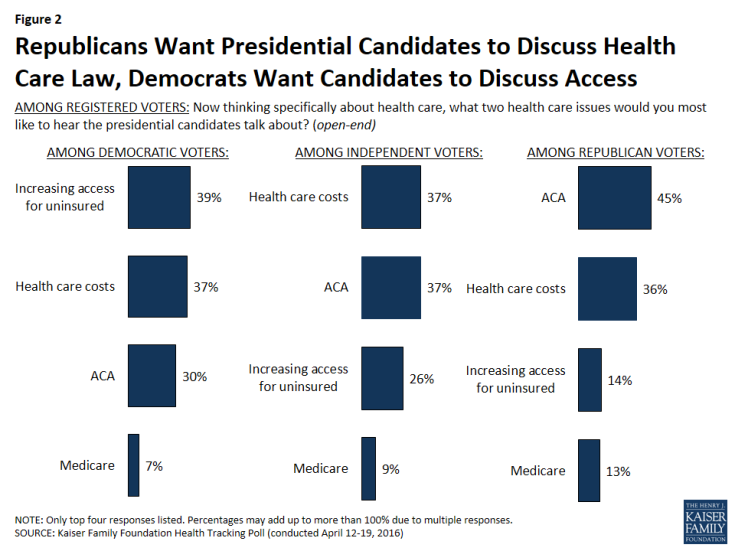
Figure 2: Republicans Want Presidential Candidates to Discuss Health Care Law, Democrats Want Candidates to Discuss Access
Americans’ Opinions of the Affordable Care Act
The public remains split on what they want Congress to do with the health care law moving forward with 32 percent supporting repeal of the law and a similar share (30 percent) supporting expanding the law; 14 percent would like to see it implemented as is and 11 percent support scaling back the law.
About one-third (32 percent) would like to see Congress repeal the health care law, yet the public is divided on whether Congress should repeal the law and replace it with a Republican-sponsored alternative or repeal and not replace it (12 percent, each).
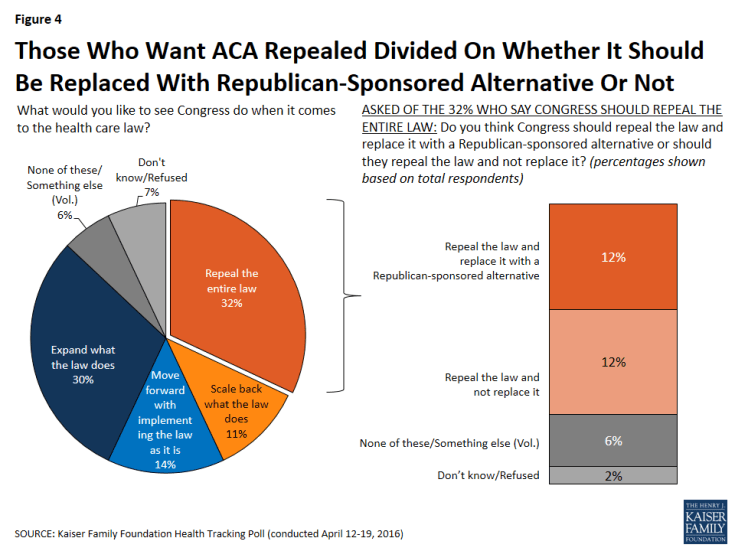
Figure 4: Those Who Want ACA Repealed Divided On Whether It Should Be Replaced With Republican-Sponsored Alternative Or Not
About half of Democrats (51 percent) want Congress to expand what the law does. This is a significant increase from 36 percent in December 2015, and continues an upward trend first noticed in January 2016. This increase may be due to the rhetoric surrounding universal health care in the Democratic presidential campaign, with both candidates advocating universal coverage as a goal.
Overall ratings of the ACA lean negative this month, with 38 percent saying they have a favorable view and 49 percent saying they have an unfavorable view.
The percentage of Democrats who have an unfavorable opinion of the law increased 6 percentage points to 25 percent, up from 19 percent last month. Of the Democrats who did not express a favorable opinion of the ACA, 40 percent want to expand what the law does, 20 percent do not know what they would like to see Congress do when it comes to the health care or mention something else, 19 percent want to repeal the entire law, 13 percent want to move forward with implementing the law as it is, and 9 percent want to scale back what the law does.

